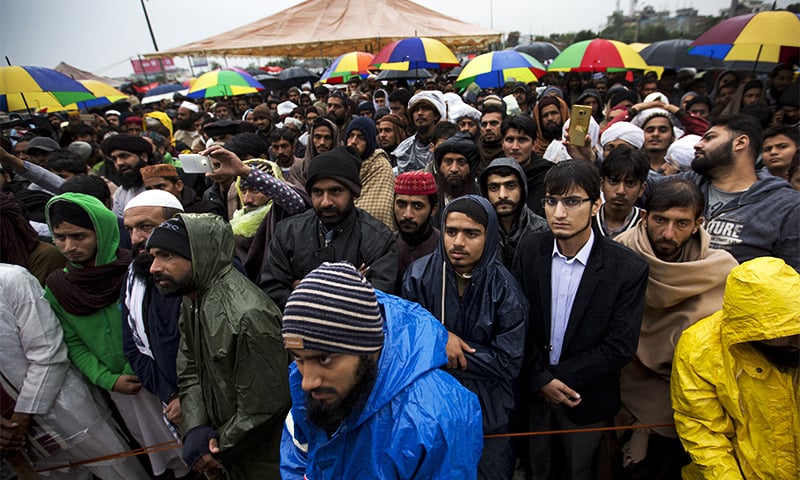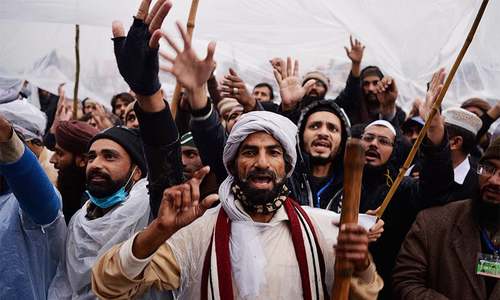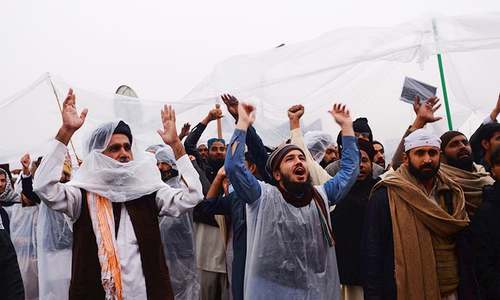The Islamabad High Court (IHC) on Thursday advised religious parties protesting in the capital against a reversed change in the Khatm-i-Nabuwwat oath in the Elections Act 2017 to end their sit-in.
IHC Justice Shaukat Aziz Siddiqui today heard a petition submitted by the Tehreek-i-Labaik Ya Rasool Allah (TLY) ─ one of the protesting parties ─ which asked for a report compiled by a PML-N committee probing the controversial amendment to the oath to be made public so that "the culprits so determined therein, may very kindly be proceed against under the relevant laws."
The court, however, said a similar petition had already been filed in the IHC and advised the TLY to end its protest as the public was being inconvenienced by the sit-in.
Daily life in the capital over the past week or so has been disrupted by protesters belonging to religious parties, including the Tehreek-i-Khatm-i-Nabuwwat, TLY and the Sunni Tehreek Pakistan (ST), calling for the sacking of Law Minister Zahid Hamid and strict action against those behind the amendment to the Khatm-i-Nabuwwat oath ─ which had earlier been deemed a 'clerical error' and subsequently rectified.
The TLY had occupied the Faizabad Bridge which connects Rawalpindi and Islamabad through the Islamabad Expressway and Murree Road, both of which are the busiest roads in the twin cities.
Fed up with the public response in the twin cities, the cold response by federal government, and the rain which started Tuesday, the protesting clerics have taken to petitioning the IHC for "execution" of their demands.
Their earlier demands, most of which have been taken back now, included the removal of Federal Law Minister Zahid Hamid and Punjab Law Minister Rana Sanaullah, Asiya Bibi’s execution, dismissal of cases against religious leaders, and the removal of clerics from the Fourth Schedule.
Earlier this week, Justice Shaukat Siddiqui, while hearing a petition submitted by Tehreek-i-Khatm-i-Nabuwwat supporter Allah Wasaya against the same issue, ordered to reverse in the Elections Act 2017 all amendments in sections pertaining to the Khatm-i-Nabuwwat oath.
Khatm-i-Nabuwwat controversy
Earlier in October, copies of the Elections Act 2017 showing changes to certain parts of the law began circulating on social media, prompting lawmakers to take notice of a change in wordings on Form-A, which is submitted at the time of election by candidates, which turned it into a declaration form instead of an affidavit, which puts a candidate under oath.
Through the Elections Act 2017, the words in Form-A “I solemnly swear” had been replaced with “I believe” in a clause relating to a candidate's belief in the finality of the prophethood of Prophet Muhammad (peace be upon him) and it had been made not applicable to non-Muslim candidates.
Sections 7B and 7C of The Conduct of General Elections Order, 2002, which relate to the status of Ahmedis, had also been omitted from Elections Act 2017.
Section 7B says that the status of Ahmedis remains as stated in the Constitution of Pakistan, while section 7C states that if an enrolled voter's belief in the finality of Prophet Muhammad's (PBUH) prophethood is contended, they shall have to sign a declaration stating so, failing which their "name shall be deleted from the joint electoral rolls and added to a supplementary list of voters in the same electoral area as non-Muslim."
Certain political parties have also taken issue with the amended Election Act 2017, which was bulldozed through the Lower House of Parliament despite strong protests from opposition lawmakers as it paved the way for ousted prime minister Nawaz Sharif to be re-elected as PML-N head due to an amendment that allowed politicians disqualified from holding public office to head a political party.

















































